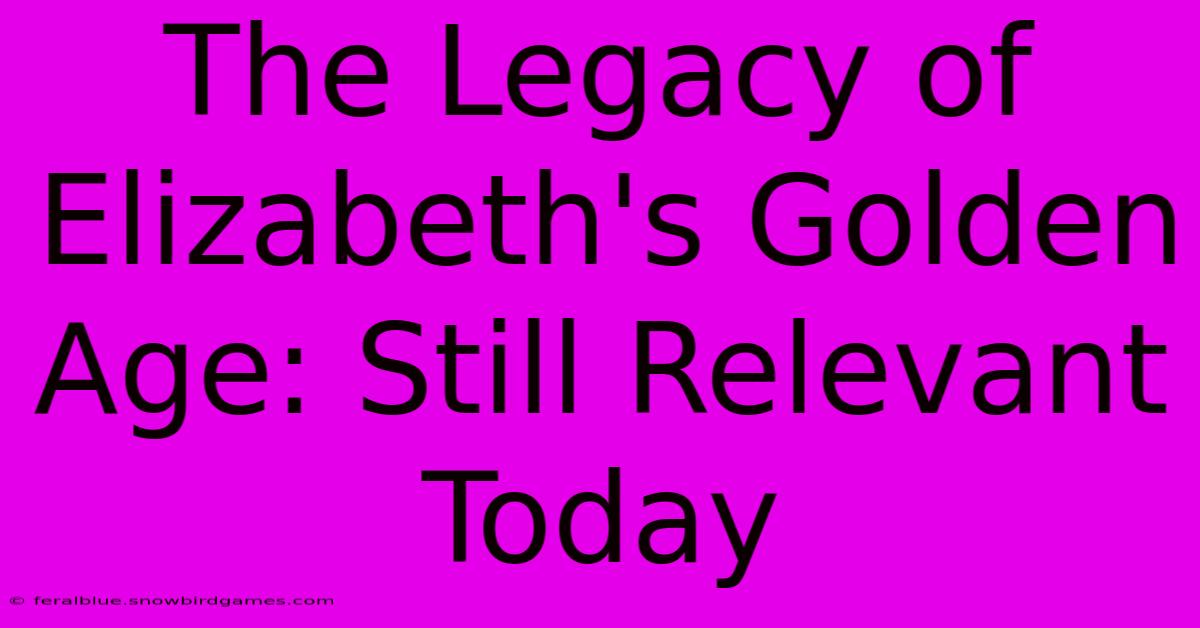The Legacy Of Elizabeth's Golden Age: Still Relevant Today

Table of Contents
The Legacy of Elizabeth's Golden Age: Still Relevant Today
The reign of Queen Elizabeth I, often dubbed the "Golden Age" of England, left an indelible mark on the nation's history, culture, and even its modern identity. While spanning from 1558 to 1603, its impact reverberates strongly even today. This era wasn't just about opulent courts and lavish displays; it was a period of significant social, political, and artistic upheaval that continues to shape our world. This article will explore the lasting legacy of Elizabeth's Golden Age and its surprising relevance in the 21st century.
A Flourishing of Arts and Literature: The Enduring Power of Shakespeare
One cannot discuss Elizabeth's reign without acknowledging the explosive growth of the arts. This era witnessed a flourishing of literature, theatre, and music, largely fueled by royal patronage and a burgeoning national identity. William Shakespeare, arguably the most famous playwright of all time, wrote many of his masterpieces during this period. His works, from the tragedies of Hamlet and Macbeth to the comedies of A Midsummer Night's Dream and Twelfth Night, explore timeless themes of love, loss, ambition, and justice. These plays are still performed and studied globally, demonstrating the enduring power of Elizabethan art.
Beyond Shakespeare: A Rich Tapestry of Artistic Achievement
Shakespeare wasn't alone. The Golden Age saw a surge in the popularity of poets like Edmund Spenser (whose Faerie Queene remains a cornerstone of English literature) and Sir Philip Sidney, whose sonnets and prose profoundly impacted the development of English writing. The period also marked a significant development in music, with composers like William Byrd and Thomas Tallis producing exquisite choral works that continue to inspire awe. This artistic explosion established England as a major cultural force, a legacy that continues to inform artistic production today.
The Seeds of Global Power: Navigational Prowess and Imperial Ambitions
Elizabeth's reign also witnessed the birth of England's global ambitions. Fueled by a spirit of exploration and a desire for trade, English navigators like Sir Francis Drake circumnavigated the globe, laying the foundation for a vast empire. This expansion, while undeniably marred by colonialism and its devastating consequences, established England as a major player on the world stage, a position it maintains to this day.
Navigational Innovation and its Modern Echoes
The innovative shipbuilding and navigational techniques developed during Elizabeth's reign were crucial to England's global expansion. These advancements had a lasting impact on maritime technology and trade, indirectly shaping the world's economic landscape and influencing modern globalization. The spirit of exploration and innovation that characterized the era continues to inspire ambitious ventures in areas like space exploration and technological advancement.
The Rise of Nationalism: Shaping Modern English Identity
Elizabeth's reign was a crucial period in the development of English national identity. The defeat of the Spanish Armada in 1588 instilled a sense of national pride and confidence. This newly found identity, fostered by skillful propaganda and a shared sense of purpose against a common enemy, laid the groundwork for a unified England, paving the way for future political stability and global influence.
National Identity in the 21st Century: A Continuing Legacy
The legacy of this national unity continues to resonate in modern Britain. While the nation has undergone significant changes since the 16th century, a sense of shared history and cultural heritage, rooted in the Golden Age, remains a powerful force in shaping English national identity. This sense of collective identity is evident in national celebrations, cultural institutions, and the ongoing debate about Britain's place in the world.
Conclusion: A Timeless Legacy
The legacy of Elizabeth's Golden Age is far-reaching and multifaceted. From the enduring brilliance of Shakespeare's plays to the foundations of England's global power and the shaping of national identity, the influence of this era remains profoundly felt in the 21st century. Studying this period provides not only a fascinating glimpse into the past but also a valuable lens through which to understand the complexities of the modern world. Its enduring relevance lies in its exploration of timeless themes and its crucial role in shaping the trajectory of English history and culture. The echoes of this "Golden Age" continue to reverberate, reminding us of the enduring power of art, ambition, and the enduring strength of a nation's spirit.

Thank you for visiting our website wich cover about The Legacy Of Elizabeth's Golden Age: Still Relevant Today. We hope the information provided has been useful to you. Feel free to contact us if you have any questions or need further assistance. See you next time and dont miss to bookmark.
Featured Posts
-
The Rise And Rise Of David Hasselhoffs Net Worth
Apr 07, 2025
-
Doomsday Mom Lessons Learned From The Unexpected
Apr 07, 2025
-
Faisal Qureshis Son A Legacy In The Making
Apr 07, 2025
-
Sara Davies Dads Campervan Freedom On Four Wheels
Apr 07, 2025
-
Find Strength In Captain Toms Daughters Story
Apr 07, 2025
